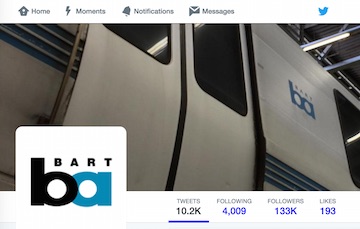The remarkable candor of Taylor Huckaby, voice of @SFBART
 Taylor Huckaby, who posts on the Twitter account of the San Francisco Bay Area Rapid Transit (BART), just turned honesty into a full-fledged funding debate. I’ll show you what’s special and effective about his tweets.
Taylor Huckaby, who posts on the Twitter account of the San Francisco Bay Area Rapid Transit (BART), just turned honesty into a full-fledged funding debate. I’ll show you what’s special and effective about his tweets.
Here’s what Huckaby tweeted in response to a complaint.
@shakatron BART was built to transport far fewer people, and much of our system has reached the end of its useful life. This is our reality.
— SFBART (@SFBART) March 17, 2016
That spawned a tweetstorm, a public debate, and news coverage, including in the New York Times.
As Jay Baer explains in his latest book, Hug Your Haters, responding to social media complaints is crucial to business success. And a quick look at the @SFBART Twitter account shows that it responds to complaints frequently. Here are a few examples.
@SFGiantsGamer we are experiencing electrical issues which have impacted service- sincere apologies.
— SFBART (@SFBART) March 17, 2016
@jalrobinson Many of us – myself included – take BART and / or commute on it. We know how it is, and we know it isn’t ideal.
— SFBART (@SFBART) March 17, 2016
But Huckaby goes farther, explaining the agency’s deperate need for capital investment to provide context for the complaints.
@GennX415 Because there are tens of thousands of physical infrastructure parts that make BART work – and many are old and deteriorated.
— SFBART (@SFBART) March 17, 2016
@MarkRuhe @bartdiaries It is extremely difficult to pass bond measures when things are running smoothly.
— SFBART (@SFBART) March 17, 2016
As Huckaby told the New York Times, “With the political climate, there’s a lot of focus right now on America’s crumbling infrastructure — why are our tax dollars not getting us anything; where’s our return on investment?”
Here’s what’s notable about this.
- BART is an underfunded public agency that doesn’t just cower in the corner. You could call much of the government “underfunded public agencies.” But I can’t think of another agency that airs its complaints in public. There’s a risk of backlash here, of course, but BART and its spokesman have determined that they’re more likely to benefit from the debate than suffer from talking about it.
- Huckaby is an extraordinary communicator. His ability to be frank about the problem and to clarify complex financial and technical issues in tweets is unusual. The bullshit-free communicator must be brief and clear. You should study these tweets and learn from them — and not just for Twitter.
- Effective communication responds to emotion with sympathy and logic. Complainers are upset. Getting upset back at them doesn’t help. As Jay Baer explains in his book, the first steps are to display empathy, and then respond with facts and help. (This presumes that people are interested in facts and solutions, which is why it’s not how Donald Trump’s Twitter operates.)
- Good social media response generates ink. BART’s funding is now a much bigger story. It’s because of Huckaby’s clever responses that there are now 106 stories about BART on places like Vox and Wired.
- Twitter excels at public debates, not conversations. If you want to talk to your friends, go to Facebook. But for a public debate among thousands of people, Twitter is surprisingly effective. Huckaby (with the support, presumably, of his colleagues at BART) responds quickly and thoughtfully to the issues that people raise. BART is actually making people smarter about its issues in the midst of its slow-developing crisis.
Thanks for the plug, Josh. I concur, and will add that it also remarkable that a public agency allows their social media frontline responder to communicate with such candor and humanity. They give Taylor the freedom to work with neither script nor net, and that’s all too rare.
Too many organizations treat “social” like a separate silo, like it is a niche digital play.
When you have someone speaking on behalf of the company or the agency on Twitter, it ought to be someone who is vetted to also respond to reporters, or other media entities.
(Yes, Customer Service responds to customers directly — but taking things to the posture of a debate is a step beyond that.)
Josh, once again you have hit the nail on the head and brought light to what normally is a hot spot.